David Greenglass, the key witness in the espionage case of Julius and Ethel Rosenberg, has died. He was Ethel Rosenberg’s brother, and his testimony doomed both his sister and brother-in-law. Greenglass explained to the jury how he had, as an engineer at Los Alamos, been drawn into a Soviet spy ring by his brother, and argued that his sister played a non-trivial role in the entire affair. Greenglass also provided, with the sanction of the Atomic Energy Commission’s classification officer, the first public description of an implosion nuclear weapon. Exhibit 8, drawn in Greenglass’ hand, was proclaimed by the prosecution to be a “sketch of the very atomic bomb itself,” and could not be countered by the Rosenbergs’ attorney. Instead, the defense argued that releasing such a sketch into the world was a security risk (even though, again, it had been pre-approved for release), and they had it impounded, where it stayed out of view until the late 1970s. Nevertheless, Greenglass’ description of the bomb quickly entered into the public eye, and “implosion” became part of our nuclear lexicon.1
(Exhibit 8 was later released, in the 1970s, for reexamination as part of a hearing on behalf of Morton Sobell, another defendant at the Rosenberg trial. The physicist Phillip Morrison argued that it was a crude, child-like sketch of the bomb, and of little value to the Soviets. The judge concluded, however, that the basic principle of implosion was still revealed by the drawing, and it was still classified. At the very least, it helped to confirm other espionage data as legitimate. The New York NARA office scanned the above version of it for me.)
Greenglass later admitted to have perjured himself. The deal was that he would implicate Ethel, and in exchange, his wife, Ruth Greenglass, would walk free. Greenglass took the deal — he didn’t want to leave his children unwatched, even while he himself went to prison. And perhaps he felt a tinge of frustration that Julius and Ethel wouldn’t cooperate like he had. Asked about it years later, he said: “My wife is more important to me than my sister. Or my mother or my father, O.K.? And she was the mother of my children.”2
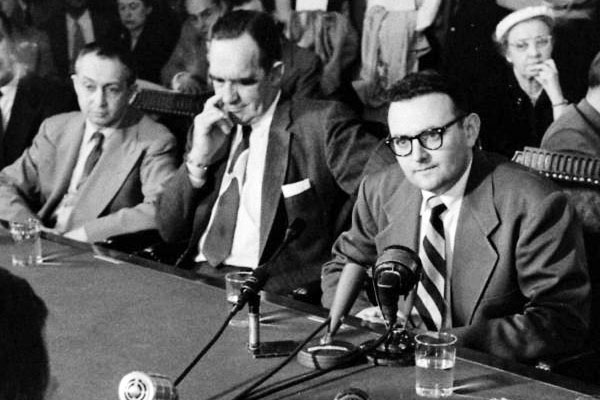
David Greenglass (in glasses), conducting some sort of testimony or press conference. Harry Gold is two seats to his right. Source: Google LIFE images.
The rules of American Cold War prosecutions, and persecutions, were pretty simple. First, admit that you had done whatever it was you had done. In the case of people accused of being Communists, it meant admitting you had been a member of the Communist Party. In the case of spies, it meant admitting you were a spy. Second, give up the names of your contacts and associates, so that they could then be prosecuted/persecuted. In this way, searches for spies and Communists was something of a security-tinged pyramid scheme, an endless engine for new sources.
What if you hadn’t done what you were accused of? Or wouldn’t confess, even if you had done it? Well, that’s the tricky case, isn’t it? The place where the system breaks down, where there real violence gets done.
In the case of the Rosenbergs, the FBI had pretty good evidence of Julius’ guilt. Not only did they have the confessions of Greenglass and Harry Gold, the “courier” for the spy ring, but they — unbeknownst to almost all at the time — also had the evidence gleaned from the VENONA intercepts, where Soviet communications during World War II had been secretly decrypted. The combination of VENONA and the confessions makes the case against Julius Rosenberg pretty much a slam dunk. Since the revelation of VENONA in the 1990s, I have not yet met a historian who doesn’t think that Julius was a spy. Because VENONA was secret, however, the FBI could not introduce the evidence into court (and secret testimony in criminal cases is generally a “no-no” under American jurisprudence), and so had to rely on the testimony of Greenglass and Gold to make the case, which made it look like a lot less obvious at the time, because both were not extremely reliable witnesses (Gold was a strange supplicant who would say almost anything; Greenglass was angling for a deal and indeed, did perjure himself).
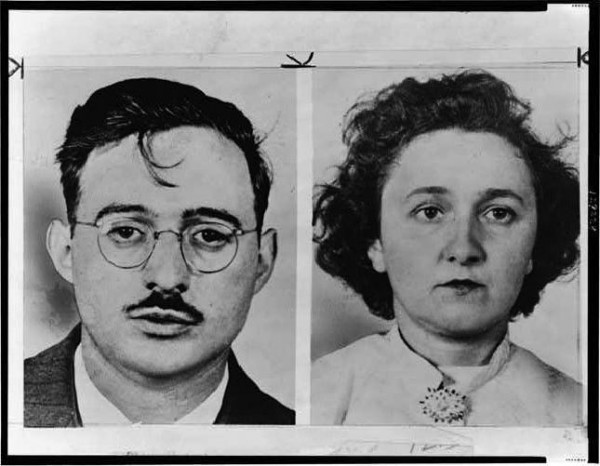
Mugshots of Julius and Ethel Rosenberg. What is going on in Julius’ mind? Source: Library of Congress.
Ethel was much more problematic. What she knew, or didn’t know, about the spy operation isn’t as clear. Julius got code-names in the VENONA transcripts (“Antenna” and “Liberal”), which indicate he was something of a key asset. Ethel’s code-name was… “Ethel,” indicating she was not. Did she know what Julius and her brother were up to? It seems hard to imagine she did not. Did she deserve the electric chair? Maybe, maybe not. I happen to be on the side that thinks that capital punishment for an espionage crime committed in the service of a state that was then an ally is extreme. Much less for someone whose role, like Ethel’s, was probably fairly minor. It is clear, from the historical record, that pushing for the death penalty for both was part of a strategy to scare the two into cooperating, and to scare others who dared not to cooperate. I don’t think executing them achieved anything like justice.
But I have some real problems feeling sympathy and empathy for the Rosenbergs. They maintained their absolute innocence all the way through their executions. They left two children as orphans. They created fissures in American politics that still resonate to this day, with Cold War liberals absolutely convinced of their innocence, and Cold War hawks convinced of their being traitors. The by-product was an ugly polarization of American Cold War politics that was potentially avoidable. Now we know that at least Julius was guilty, and that he lied to everyone, repeatedly. He had the choice to avoid the chair. He chose to be a martyr. And, again, to orphan his children.
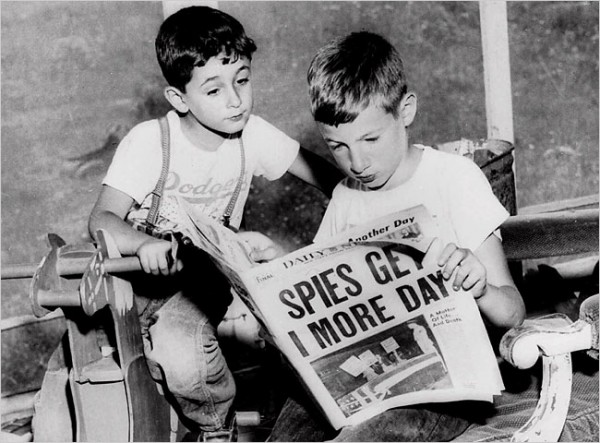
“Ethel and Julius Rosenberg’s sons, Robert, 6, left, and Michael, 10, looking at a 1953 newspaper.” Photo from the Associated Press, via the New York TImes
I find that hard to respect. Who was he protecting? Stalin? The Communist Party? His reputation? It is hard to conceive what cause would be worth what he did. It is one thing to doom himself, but another to doom his wife. And I keep coming back to the children. Who would do that to their children? Both of the children were, until relatively recently, defenders of the innocence of their parents, which makes perfect sense. What a crushing blow to believe the contrary.
Part of the problem, from a latter-day point of view, is that Julius Rosenberg, by the very nature of his lack of confession, is a Sphinx. On his motivations and justifications, he is silent — he never told his side of the story, the real, non-B.S. side of the story. It makes him feel cold to me, gazing out from those pictures. I find myself saying: “Why’d you do it?” We know he spied. If he had just told us why, maybe we could understand, and have some empathy. But he took his side of the story to his grave.
It is a very different situation than with Klaus Fuchs, Theodore Hall, Harry Gold, and even David Greenglass. Fuchs confessed at length about his motivations, his feelings on the subject. He felt the Soviets were owed the information, as those who were bleeding the most during the war against Fascism. Hall was very young at the time of his espionage, but one can recognize and sympathize with the naive politics of youth. And Hall’s central belief, that maybe the world would be safer without just one country having atomic weapons, is not actually a totally naive position — it is the essence of deterrence theory, for better or worse. Gold’s way into espionage was not ideological, but psychological: he was a needy person and fell in with the wrong crowd, who exploited his near-pathological desire to please. (When he was caught by the FBI, they exploited this as well in turning him into a key witness.)3
What if Julius had left a last testament? A confession to be released years later? How would that change the story? What if he pled with us to understand his position? I can completely understand why someone would spy for the Soviets during World War II. The Communists appeared to many to be the only real power willing to fight Fascism, racism, and economic injustice. Was it a big sham? Of course. Stalin was no freedom fighter. The American Communist Party was opportunistic and crass regarding its cause célèbres. But one can at least empathize with the position: you can see the world through their eyes, at that terrible time, and conclude that cutting the Soviets out of the atomic bomb project was a form of injustice.
But can I find a way to understand the silence of Julius Rosenberg? Why he doomed himself and his wife to death? Why he doomed his children to orphanhood? This I struggle with. What could be worth all that? Who, or what, was he saving? It is hard for me to imagine anything worth that. To me, this is much worse, from a human standpoint, than the spying. Spying makes sense to me. It happens all the time. But lying in such a self-destructive way, for seemingly no purpose? This makes no sense.
And so Julius Rosenberg brings a bad taste in my mouth. As a historian, this is not a great thing: one wants to be as objective and neutral as possible with regards to one’s historical actors. One doesn’t want to develop personal animosities, even for terrible people, because it can color your viewing of the past. I don’t think I would be able to be wholly neutral with regard to Julius. Fortunately, he comes into my research only glancingly (I am not interested in him, per se, but I am interested in how the AEC, FBI, etc. handled the trial). If only he had told us what he felt, why he did what he did! Even if it was stupid, even if it was naive, even if it was pathetic — it would be something to go on, something to feel for, something to make a connection to.
Greenglass’s choice of his wife and children over his sister and brother-in-law is an agonizing one. One can hardly fault him for choosing the path he did. Especially since, if Julius had confessed to what we now know for sure that he did, nobody would have been executed. I find myself pitying David Greenglass. He made some bad decisions, and paid a very steep price for them. I have a harder time finding similar pity, or sympathy, for his brother-in-law, Julius, whose historical silence is deafening.
- The authoritative account of how Greenglass’ testimony on implosion and the AEC’s role in its release is Roger M. Anders, “The Rosenberg Case Revisited: The Greenglass Testimony and the Protection of Atomic Secrets,” American Historical Review 83, no. 2 (April 1978): 388-400. The response of the Rosenberg lawyers is discussed in Ronald Radosh and Joyce Milton, The Rosenberg File, 2nd. edn. (New Haven, Conn.: Yale University Press, 1997), 188-195. [↩]
- As quoted Robert McFadden, “David Greenglass, the Brother Who Doomed Ethel Rosenberg, Dies at 92,” New York Times (14 October 2014), A1. On Greenglass’s lying, see Sam Robert, The Brother: The untold story of atomic spy David Greenglass and how he sent his sister, Ethel Rosenberg, to the electric chair (New York: Random House, 2001). [↩]
- On Hall, see esp. Joseph Albright and Marcia Kunstel, Bombshell: The Secret Story of America’s Unknown Atomic Spy Conspiracy (New York: Times Books, 1997). On Gold, see the really quite remarkable Alan Hornblum, The Invisible Harry Gold (New Haven: Yale University Press, 2010). [↩]
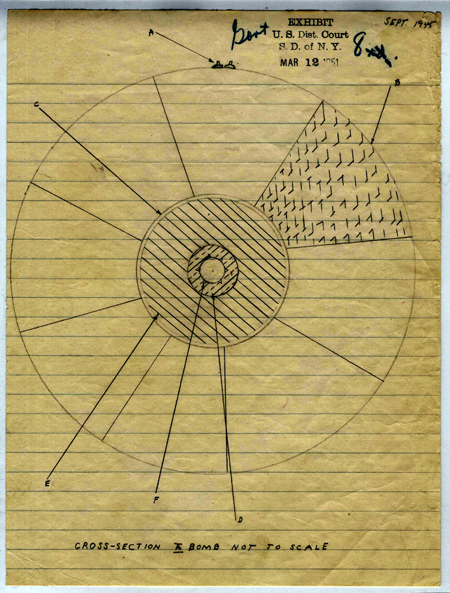


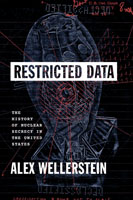
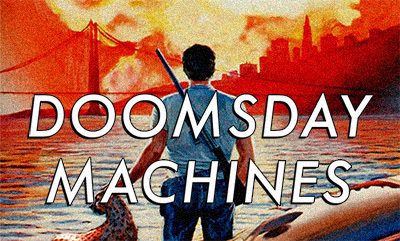
Beautiful essay, Alex. At first, after I clicked on the Life magazine link, I thought that the Rosenbergs were going to have to be pretty bad to be worse than the social and health implications of the old ads in that magazine. Then I finished the essay and of course, you’re dead right.
Good analysis.
These stories always make me wonder about the attempt to exclude the Russians from the Manhattan Project. Was it based on the assumption that we were ultimately building the bomb to use against Russia? Did we think the Russians might have German spies, and therefore could not be trusted to keep the secrets? Was it a knee-jerk ethnic prejudice against Slavic peoples in general? Obviously it failed, due to spying, and it laid the cornerstone for Cold War politics.
Bomb secrets became like the secret of Samson’s hair – a simple fact, which if known by our enemies can render our superhero helpless. It is hard to imagine the witch hunts of the McCarthy era without the nuclear secrets business.
I don’t know who, in the first instance, wanted to exclude the Soviets. That Churchill would have wanted them excluded seems totally likely — he never trusted them. But Roosevelt is so much trickier. He excluded the Soviets and, initially, his own Navy. And eventually his own Vice President.
I have the impression, based on nothing I can remember or easily find, that during the Manhattan Project Russia was seen as the enemy we’d have to face after Germany. Maybe the reasoning went like this: we have to build the bomb because Hitler is building one > ok, Hitler is defeated but we need to test and use the bomb anyway because now that it’s invented, Russia will certainly invent it too. But if that’s the case, Alex, you’d surely know about it. So maybe it’s not the case.
For some additional information on this, have you read “Engineering Communism”, which is about Joel Barr and Alfred Sarant, two other members of the ‘Rosenberg ring’, who managed to make it to the Soviet Union, where they helped introduce the transistorised computer.
The early chapters in particular help explain why they felt that they should pass information on to the Soviet Union.
I agree with your point about Julius but I am also deeply puzzled by Ethel. She also defiantly when to her death without a word. I am able to imagine a man who is bent on some twisted notion of martyrdom to leave his children fatherless, but a mother!? She must have been a very unusual person in life.
It is interesting that you bring Hall into your story. He was not part of the Rosenberg ring. Hall got away clean, enjoyed a good education and a rewarding career ending up in England. He not only provided a parallel source for the Soviets on implosion but also gave them information on the hydrogen bomb. I understand he was also implicated by Venona. Why did the FBI give him a pass?
As long as you are naming the nest of spies engaged in sending secrets about the Manhattan Project to the Soviets please don’t leave out George Koval. He gave them information on the initiator for the implosion bomb. That was another difficult nut to crack for the scientist working on implosion. Koval actually moved to the Soviet Union after the war. I say moved instead of defected because I don’t think the Cold War had actually begun when he fled the US.
Finally I would just like to comment on this: “I can completely understand why someone would spy for the Soviets during World War II.”
I cannot! The ONLY reason the Soviets seemed to be “…the only real power willing to fight Fascism” IS BECAUSE HITLER INVADED! That is it! Stalin had at first been a willing ally of Hitler! Stalin helped with the destruction of Poland. Stalin happily watched as Hitler invaded France. He imagined another situation as happened during the First World War and that the capitalist countries would exhaust themselves. Stalin and the Soviets would then embark on their own campaign of expansion and communist revolutions. France and Great Britain WERE THE FIRST REAL POWERS willing to fight Fascism! Stalin was sending raw materials to support Hitler’s war effort right up to the day Barbarossa began.
So can we really call Stalin an ally like Churchill? No, my conclusion is an emphatic NO! FDR agreed. That is why Churchill was in the loop on the A bomb, Canada was in the loop, but Stalin was not.
My understanding as to why he got a “pass” is that they were unable to establish a “clean case” against him. That is, a case that would be a successful criminal prosecution without admission of VENONA information. I actually have a FOIA request out for Hall’s FBI file, though, which apparently has some 4,000 pages of material, so maybe that will shed more light.
As for understanding the motivation — I didn’t say I agreed with it, but I find it comprehensible. You can see this ways in which someone would intellectually justify it, even if it meant overlooking inconvenient facts (or imagining them to be fabrications of some sort).
Alex-
Great post. I have an awkward question which you might wish to delete or answer offline. A student asked me last year – and I think it was an earnest question – why “so many of the atomic spies were Jewish?” Other than noting a tendency for members of the CP to be from radicalized and perhaps Jewish backgrounds, I had no good answer. I’m still struggling with this, given the statistical imbalance etc.. I’d really be curious as to your thoughts as this wasn’t the fist time I’ve had this question.
PM
It seems like there are lots of good reasons for it. One is the same reason there are a lot of Jewish physicists involved in the Manhattan Project in general — because feared enemy #1 was Hitler, and that’s quite a motivation. Plus the fact that there was still plenty of mainstream anti-Semitism around the period of World War II in American and European culture, something exploited by the Communist Party. I have been recently reading Nicholson Baker’s Human Smoke and this is something that comes through quite strongly — the casual way in which mainstream American and UK politicians treated the accounts of persecution coming out of Germany. Even Roosevelt and Churchill. One gets the impression, from many things they said and did, that while they thought what the Germans doing was extreme and uncalled for, that on some level they agreed that the Jews were an irritating “problem” and what they were taking issue with was the “solution.”
We’re also talking about very small sample sizes, which are non-coincidentally linked to each other (e.g. Greenglass and Rosenberg are not really independent variables here).
Alex,
Thanks; this is a good response and contains all sorts of nuances I’ll try to convey to my little darlings.
P.
I think you are being unfair to Julius Rosenberg. The Feds didn’t have to give anyone the death penalty. As you point out, they didn’t have to give Ethel the death penalty and orphan the Rosenberg children. Killing both parents did not serve any national security interest, it was simply a way to terrorize people who were perceived, rightly or wrongly, as having an chosen the wrong side. If you want to blame someone for orphaning the Rosenberg children, it should rest squarely on the shoulders of the people with all the power: the prosecutors, the FBI, the snitches, HUAC, and countless others who engaged in the red scare for patriotic and selfish motives.
I would also argue that if you want to speculate effectively on Julius Rosenberg’s motives, you need to open your self to a wider range of evidence. Off the top of my head I can think of a couple of reasons why he would not plead guilty, or leave a testament to explain his motives:
1) He was a stone cold believer in Communism and ready to offer up everything in his life for what he saw as the greater good. Individual happiness was irrelevant to the broader historical significance of the class struggle. Period. It is important to remember that people who joined the communist party on an international level believed this fervently before Stalin’s death in 1953 and the Hungarian uprising in 1956. Take a look at Eric Hobsbawms’ biography, _Interesting Times_ (2002) for examples of this kind of thinking in 1930s Britain and over the course of EJH’s life.
2) On a more speculative note I would also say that Julius Rosenberg had the examples of Bukharin, Kamenev and Zinoviev during the Moscow Show Trials to think about. As a communist, he would have been familiar with the political and ideological lessons that Party members were supposed to draw. The spectacle of these former colleagues of Lenin confessing that they were fascist agents must have been demoralizing, even if it served a greater purpose in the eyes of the Party. Their pitiful confessions, groveling debasement, and discrediting of their life’s work was repulsive. They died like dogs. I bet that Rosenberg would have liked to at least die with some dignity. The best way to do that would be to admit nothing.
3) I imagine that Julius Rosenberg realized that the less he said in his own trial, the better. Confession would have been craven and played into the hands of the class enemy. A posthumous testament would have also been subject to appropriation by the US government. If the USSR was ultimately victorious in the class struggle, then Rosenberg’s decisions and the sacrifice of his family would have been exonerated and even lauded by later historians. He would have been regarded as a martyr who gave his all for the cause.
None of this is terribly humane by twenty-first century standards, but its of a piece with the actions of many people who joined the Communist Party around the world between the 1920s and the 1950s. Its an example of how quickly the values and presuppositions of an era can slip by us.
I fully agree that capital punishment doesn’t fit the crime here. That’s a totally separate discussion, though, once capital punishment is on the table. But the feds didn’t invent the punishment, here — capital punishment for violating the Espionage Act had been on the table since World War I. What I find being “too hard” here is being hard on “the snitches,” as you put it. I can understand the position of Greenglass and Gold. They are the sort of human beings I can imagine knowing — the ones who are frail and believable. Rosenberg is not the kind of human being I can imagine knowing — a zealot, willing to take the whole ship down with him. I don’t see why I should be less harsh on the zealots.
(And one can make a similarly sympathetic reading of the prosecutors, the FBI, the judge, etc. Stalinism, and the Cold War, was no joke, no mere talking point. They thought, however wrongly, that the Rosenbergs had contributed to the Soviets getting the bomb earlier than they otherwise would have, and that that gave the Soviets the leeway to start the Korean War, that was leading to lots of unnecessary deaths. The reality is more complicated than that, but that’s no trivial thing to be concerned about.)
I just find it hard to believe that his belief in Communism was so great that he was willing to sacrifice so much for it. His own life, sure. Lots of people martyr themselves. But there was so much more connected to his decision than just himself. That’s what I find hard to fathom. Who sacrifices their wife and their children, in essence, to an ideology? That’s pretty hard for me to relate to.
As for the class enemy, etc., it seems equally likely that he could have asserted what he did and why he did it and why he was proud of it. I don’t see why that plays into the hands of the “class enemy” more than total denial, which in the long term, if more evidence comes out (as it did), makes it clear how much of a liar he was.
First of all, thank you for the fascinating essay.
“I just find it hard to believe that his belief in Communism was so great that he was willing to sacrifice so much for it.”
As a Russian, I don’t. It does however occur to me that he is very anomalous for an American. Among European communists – French, Italian, German, Spanish, or of course Russian – this kind of fanatical mentality would’ve fit right in. After all, communists made a cult of sparing neither themselves nor others, including relatives, for the victory of their cause; this was a common leitmotif in the ideologically correct parts of Soviet culture from start to finish, so much so that it eventually becomes somewhat harder to imagine such a lukewarm “communist” that would balk at it (even though of course in reality most of them did struggle with it). Perhaps in an American communist like Rosenberg, surrounded by a particularly unsympathetic (to his outlook) society, this tendency became more purely self-destructive than destructive.
I do agree that it wasn’t a very rational sort of martyrdom, however, it seems to me that martyrdom, especially in the name of an abstract ideology, often isn’t rational at all. It was a gesture of personal defiance, likely encouraged not just by his ideology but also by some emotional issues. For whatever reason (maybe a simple lack of confidence in his eloquence? maybe he was simply resigned to it not making any impact and wanted to save himself the effort?) he chose to remain silent.
Of course understanding such things is not the same thing as feeling sympathy for someone like that. Genuine fanaticism is generally repulsive to non-fanatics.
What David Greenglass delivered to Julius Rosenberg was of minor value, Gen. Leslie Groves testified in 1954, according to a recently re-issued transcript: “I would never say that publicly. Irrespective of that in the overall picture, the Rosenbergs deserved to hang.” But other sources suggest that Greenglass was the first to point the Soviets towards implosion. Who’s right? How much of a heads up did that give them? Will we ever know?
Sam Roberts
author of, “The Brother: The Untold Story of the Rosenberg Case”
Hi Sam,
I don’t actually put a whole lot of value in what Groves said in 1954, except as a reflection of Groves’ point of view at that time. In context, he was really complaining about Fuchs and the British when he said that, trying to emphasize that the real problem with Manhattan Project security was their lack of forthrightness with him (and not any failure on his own part, which Greenglass would have been).
Personally I think pointing someone towards implosion is not that big of a deal; the very idea of implosion was a very easy thing to transmit (you can do it in a single sentence), and was apparently independently conceived of a few times during the Manhattan Project itself, and was immediately conceived of in the postwar by American physicists entirely disconnected from the project, so it is not much of a secret (as W.S. Parsons argued in 1945). The devil is in the details (the tricks necessary for actually achieving it), which Fuchs was able to provide at a much higher level of detail than Greenglass (owing to Fuchs being much more competent at this stuff than Greenglass, much more connected to the details of the work, and having a photographic memory).
Even then, though, I personally am in the camp who thinks that this sort of “design” espionage (from all sources) has less of an effect on the speed of the Soviet bomb project than it is often considered to be. As others (e.g. Michael Gordin, Alexei Kojevnikov) have argued, looking at the Soviet records, one can see that the pace of the Soviet project was set by their difficulties in acquiring adequate uranium supplies and the production aspects, not the theoretical aspects of bomb design. And they did not use the espionage information in an optimal fashion, owing to Beria’s distrust of the spies and his own scientists. The most important implications of the design espionage in my mind was that it tipped off Stalin to the degree to which he was not being trusted by his Allies — it was as much a diplomatic secret as a technical secret.
Judge Kaufman was accidentally correct when he claimed that the Rosenbergs were responsible for the Korean War. Sarant and Barr worked in the defense industry and stole the information for the proximity fuse, which the Soviets used to lethal effect. The FBI attempted to capture them but failed, although they were photoed entering a Soviet Embassy in Mexico. Barr later returned to the US and was actually interviewed on Night Line. My own view of the Rosenbergs was that they were true believers in Communism and thought the US was a predator whose policies would threaten world peace. Thus, they never saw themselves as mere spies. A close reading of their jailhouse correspondence shows a couple determined to become martyrs and so they welcomed their executions and were willing to manipulate their children, even from beyond the grave, to carry the burden of their alleged innocence. In this they were helped by the despicable “dear Uncle Morty Sobel,” who, after years of lying to them, finally admitted to Sam Roberts that they all were spies. There were an no admirable human beings in this tale of deceit. Of course, the execution was a terrible error and played into their hands. Had they been given lengthly jail sentences, they would have as much resonance for contemporary audiences as, say, Klaus Fuchs, whose material was much more useful to the Soviets.